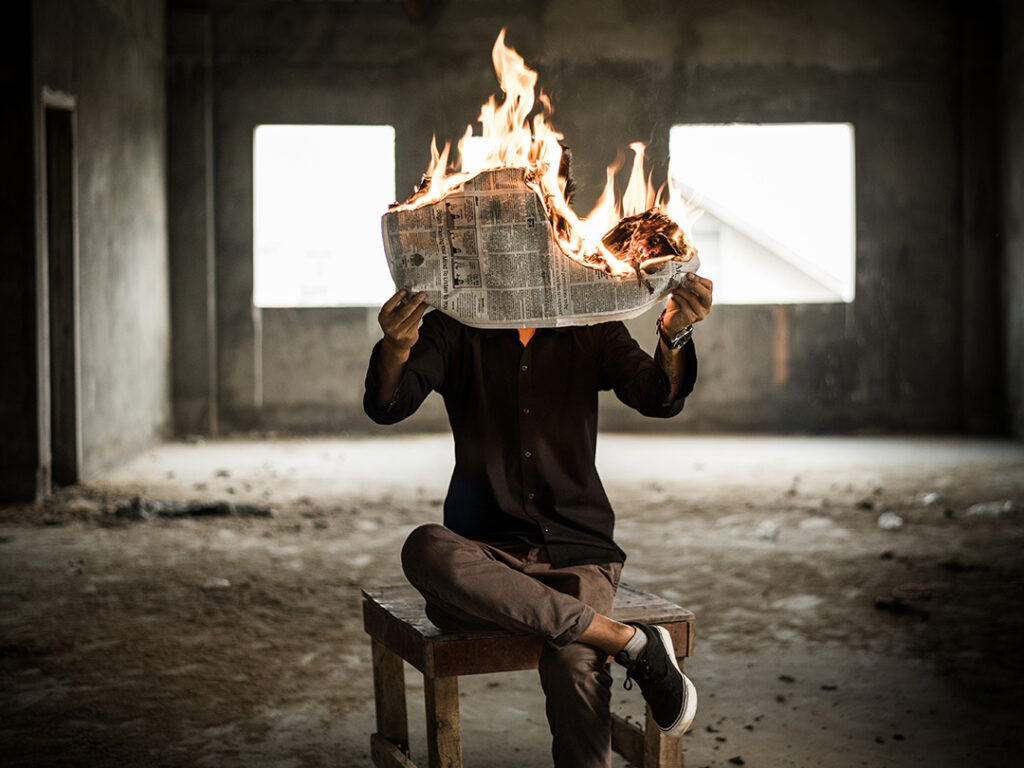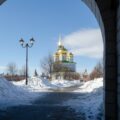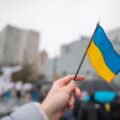Insights from the dashboard: The role of fake news and religion in the Russian invasion of Ukraine
Insights from the dashboard: The role of fake news and religion in the Russian invasion of Ukraine
Fake news and conflicts are intermingled in many ways. But how are they connected to religion and Russia’s war against Ukraine?
Alternative facts, conflict, and religion in the dashboard articles
The EARS dashboard allows us to make connections between many contemporary topics regarding religion. This time, we find out how alternative facts and conflict are connected toreligion in European media. From April to December 2022, a total of 1,671 articles were added to the EARS dashboard. The dashboard allows us to dive deeper into certain topics of interest.
When selecting alternative facts and conflict, 602 articles remain that include one or both of these keywords. To further narrow down our search, we can select the ‘&’ button. This means that all of the resulting summaries will include both keywords. This leaves us with 112 summaries. When limiting the Countries to only Ukraine and Russian Federation, 89 articles remain. Because of our initial topic selection, all of them discuss alternative facts and conflict in relation to religion in the context of Ukraine or Russia.

Topic Venn and word cloud
One of the many valuable tools on the dashboard is the topic Venn. It shows us what other topics the keywords of our scope are connected to in the European media. As shown below, in this case, the most frequently occurring topics in combination with alternative facts and conflict are tension, religious institutions, protest, state, and leadership.
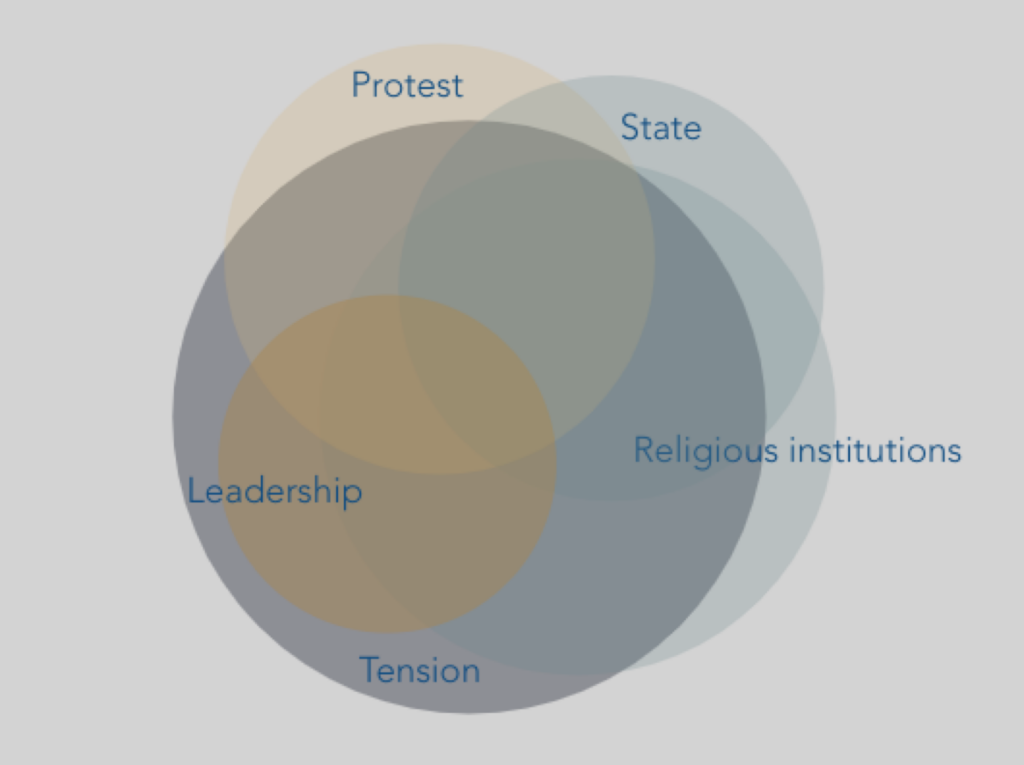
When scanning through the 89 summaries of the media articles, it turns out that many of them indeed concern themes such as leadership. Many of the articles discuss the statements of Patriarch Kirill of Moscow, the head of the Russian Orthodox Church. His rhetoric is argued to resemble German “war theology” during the two world wars, as he uses the Bible to encourage people into the war[1] and calls the war “holy.”[2] The kind of information he spreads about Ukraine is considered ‘fake news’ in the Western media.[3] [4]
The notion of the frequency of leadership in the articles is also supported by another useful tool on the dashboard, the word cloud. As shown below, Patriarch Kirillis well represented among words such as Ukraine, Russian, and church in the most occurring words within the articles in our search.
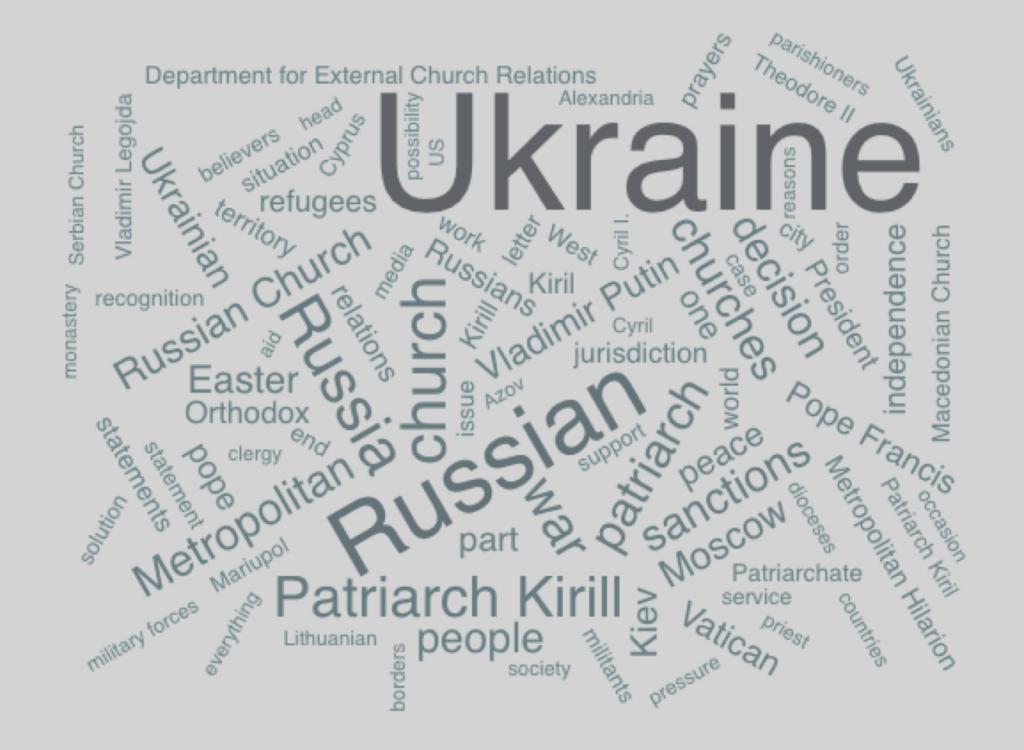
Leadership in the war
Other religious leaders are also well represented in the media articles in our scope. For instance, Metropolitan Epiphanius of the Ukrainian Orthodox Church (Ecumenical Patriarchate) has condemned the acts of Patriarch Kirill as, according to Epiphanius, Patriarch Kirill has tried to expand the Russian Orthodox Church beyond the borders of Russia since 2018.[5] Pope Francis has also commented on the war and Patriarch Kirill’s role in it by saying that he wishes that Kirill would not submit himself as a “minister of President Putin.” In Russia, Metropolitan Hilarion of Volokolamsk, the President of the Department for External Church Relations of the Russian Orthodox Church, has defended Patriarch Kirill by arguing that even though the European Union has set sanctions against Patriarch Kirill,[6] the patriarch will continue his work as usual.[7]
Fake news and religion in Russia’s war against Ukraine
In light of the articles in our scope, it is obvious that there is a discrepancy between the opinions of the West and Russia about the role and side of the Russian Orthodox Church in the war. Patriarch Kirill has stated that “Russia has never attacked anyone,”[8] whereas Western countries strongly disagree with this. The articles thus show us that religion is involved in the war. On top of that, alternative ‘facts’, or fake news, are causing quarrels and discord between not just countries but churches and religious groups as well.
In the future, it may become even harder to distinguish the false from the truth, as different ideologies divide people into different lodges. Religion is certainly part of this development, and, as shown in the articles, it can even contribute to the division. On the other hand, there is also potential for another kind of path – a path of peace and dialogue within and between religions. The future will show us which path religious groups, and the Russian Orthodox Church in particular, will follow.
Learn more on the EARS dashboard
The EARS dashboard allows you to gain insights into many topics, including alternative facts and conflict. It is a free tool that allows you to make connections like those described above, and to find out about relationships between interesting subjects across Europe. Please visit the dashboard to learn more.
Our team of analysts conducts research on topics relating to religion and society. Find out their relationships on the EARS Dashboard.
Sources
[1] Kyrills Rhetorik erinnert an deutsche “Kriegstheologie”
[2] Οικουμενικός Πατριάρχης: Αυτό που συμβαίνει στην Ουκρανία είναι μια ντροπή
[3] see e.g. Литва запретила въезд в страну Патриарху РПЦ Кириллу
[4] see e.g. Kyrill I., Putins bärtiger Hassprediger
[5] “Это нонсенс”. Чем украинские раскольники пригрозили Москве
[6] Patrijarh Kiril, još jedan Vladimir iz Sankt Peterburga, na spisku sankcija EU
[7] Ιλαρίων: «Οι δηλώσεις του Πατριάρχη αντιμετωπίζονται από την Δύση υπό το πρίσμα της προπαγάνδας»
[8] Патриарх Кирилл заявил, что Россия никогда ни на кого не нападала
